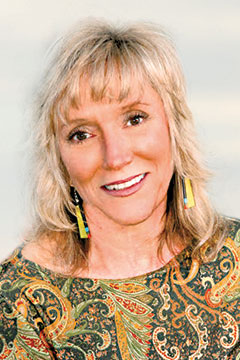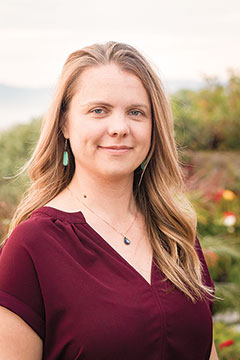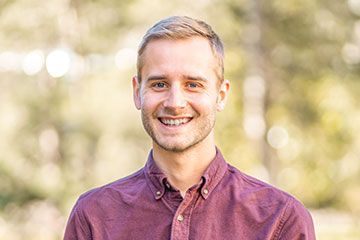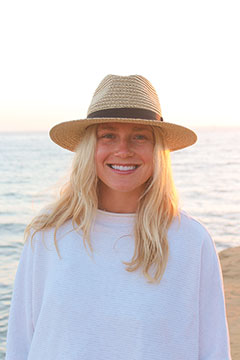Collective Impact
From agriculture to corporate strategy and policy advocacy, Pepperdine University alumni make significant contributions to sustainability efforts for a more just world
Sustainability, or the ability to avoid depleting natural resources for the protection of the environment and future generations, seems to be at the forefront of public discussion, especially as leading corporations across the globe commit to decreasing carbon emissions drastically in the coming decades. With seemingly even more green and sustainable initiatives kicking off in all business sectors, careers in sustainability are in high demand.
Through their work in education, policy advocacy, and corporate sustainability strategy, Pepperdine University alumni are making impacts both large and small on sustainability initiatives at every level and in every sector. These five alumni—Avery Davis Lamb (’16), Bonnie Nixon (MA ’16), Kacie Scherler (’13, MA ’16), Petra Sikorski (’19), and Sara Train (MBA ’19)—share how their lives, dedicated to purpose and service, contribute to the collective efforts toward a sustainable future.
Avery Davis Lamb
When Avery Davis Lamb first took a sustainability course at Pepperdine, he felt a strong calling Avery Davis toward ecological conservation Lamb and environmental work while also unlocking the unique ability faith communities could have to make lasting and positive impacts on the climate.
“There was a powerful way that Steve Davis, Chris Doran (’98, MDiv ’02), and Lee Kats spoke about their care and love for the planet and how their faith informed their science,” reflects Davis Lamb.
Inspired by his Pepperdine faculty mentors, Davis Lamb received a bachelor of arts in biology and became one of the first alumni to graduate with a sustainability minor. He quickly set off for Washington, DC, where he worked with Sojourners, a magazine and social justice nonprofit focused on connecting faith to social change, and Interfaith Power & Light, an organization dedicated to inspire communities of faith to take action to protect God’s creation and to advocate for climate policy on Capitol Hill. For three years, he was an active voice in environmental organizing and advocacy at the grassroots level and in emboldening faith communities to support both federal and local climate initiatives through education and communication campaigns. He played an integral role in the organization of the 2017 People’s Climate March and testified before the Environmental Protection Agency in 2018 to advocate for clean energy.
Now Davis Lamb serves as the co-executive director of Creation Justice Ministries and is pursuing a master of theological studies and master of environmental management at the Duke Divinity School and the Duke University Nicholas School of the Environment. He reflects that at times this work is tough and exhausting, especially as the injustices of climate crises lay bare issues of racism and classism. In another way, however, he finds courage as he sees a more unified effort in policy decision-making to effect greater change on the federal level and as faith communities seek to emulate hospitable Christianity to address the issues of the world.
“I am endlessly encouraged by my faith to keep going through this work,” shares Davis Lamb. “I hope, collectively, we can build a better, more beautiful world for everyone.”
Bonnie Nixon
With more than 40 years of experience in sustainability, Bonnie Nixon has been a devoted leader in sustainable supply chains and corporate responsibility. Beginning her career in water safety, hazardous waste disposal, and other environmental cleanup projects, she worked as the director of public relations for the Boston Harbor cleanup beginning in the late 1980s before joining Hewlett-Packard as the director of global sustainability and ethical sourcing.
“I see sustainability as a human rights issue,” shares Nixon. “The people who have the least are often the ones to face the dire consequences of irresponsible strategies.”
As a primary sustainability leader for multiple corporations, Nixon visited global factories and distribution centers to audit each location’s compliance with ethical standards. She witnessed people working in unhealthy and dangerous conditions across the globe—what Nixon described as the painful truth of too many corporate supply chains today. At every step, Nixon works to eradicate such conditions, which are especially prominent in diverse and Indigenous communities. She believes that each corporation should act responsibly and accept the costs of ethical sourcing for the sake of future generations.
Between each of her monumental and influential years of service for sustainable corporate strategy, Nixon has remained an active consultant, public speaker, and educator advocating for sustainable solutions driven by human rights. Her work also highlights the role technology can play not only in helping organizations adopt more humane strategies but also helping young people learn the critical importance of environmental work at an early age. To build upon her broad industry knowledge, she received a master’s degree in learning technologies at the Pepperdine Graduate School of Education and Psychology (GSEP) and is currently completing a PhD in global leadership and change at the school.
“At times this work is excruciating, especially when you are telling CEOs what they don’t want to hear,” reflects Nixon. “When it feels particularly hard, I turn to my faith to bolster me for this service to the world.”
Kacie Scherler
When Kacie Scherler was first introduced to the subject of sustainability during her undergraduate journey at Pepperdine, she felt a noticeable shift in her mindset and was empowered to apply everything she learned to become a positive change maker for a better world.
“Pepperdine cultivates a remarkable community of people who care deeply about our world,” shares Scherler. “That community made me feel like we could do anything.”
After receiving a bachelor of arts in intercultural communication, Scherler pursued a master of arts in social entrepreneurship at GSEP, where she built her knowledge of sustainable agriculture and supply-chain management before moving to San Francisco to work for Fair Trade USA, the leading third-party certifier of fair trade products, and Village Enterprise, a community-based organization focused on ending extreme poverty in African villages.
In 2019, when an autoimmune disease prompted her exploration of food free of pesticides, herbicides, hormones, and antibiotics, Scherler and her husband made the decision to return to her family’s farm in rural Oklahoma and raise the food to meet her dietary needs themselves. Once settled, they founded RE:Farm, a small, local farm practicing regenerative farming informed by Indigenous ecological philosophies, including rotational grazing to keep enough plant matter on the soil for the plants to grow deep and healthy root systems.
“Working with Fair Trade I saw how large and convoluted supply chains are and kept asking myself, ‘Are these really sustainable?’” Scherler says. “When we were thinking about our own farm, we wanted to make it truly regenerative from plant diversity to soil management.”
The couple continues to grow their farm to provide ethically sourced food that is accessible and convenient for their community while also encouraging fellow farmers to convert small percentages of their land to regenerative farming as a first step. Scherler is also eager for their launch of RE:Supply, a waste-free shopping experience, the first of its kind in their community.
“At Pepperdine I had such a desire to make big changes to the world,” reflects Scherler. “I know what may seem like small impacts now will make big impacts on this community.”
Petra Sikorski
Petra Sikorski knew she would work in sustainability after spending one summer before college on the Svalbard Islands in Norway, one of the world’s northernmost inhabited areas. While there, Sikorski witnessed glaciers and frozen tundra, the stars of the rough landscape, diminishing. Upon her return to the US and on her journey to Pepperdine, she joined Doran, professor of religion at Seaver College, in his first-year seminar course centered on climate change.
“I had never seen climate justice and Christianity blend so perfectly together before that class,” Sikorski shares. “We were able to get to the ‘why’ in each discussion to compel us deeper into the topics.”
After studying abroad in Switzerland, where she saw the idyllic small-scale farms practice regenerative and sustainable farming successfully, she was doubly motivated to continue this work. After receiving a bachelor of arts in political science with a minor in sustainability in 2019, she joined sustainable tech startup Cloud Agronomics. As the director of business development, she is bringing powerful technology to large-scale farmers to help them efficiently and accurately track carbon and other micronutrients like nitrogen, phosphorus, and potassium in the soil.
“We need to bring convenience and offer incentives while also communicating the long-term benefits of sustainable farming so large-scale farmers can take the risk in adopting these practices,” says Sikorski.
Most large-scale farmers practice monocropping, which involves growing only one crop in one field, and lack the resources to use high-quality fertilizer, compost, crop rotation, and cover cropping. As a result, more resources are used to harvest enough crops to keep the farm in business.
“Despite the challenges of this industry, from advocating for policy change to educating partners, we are seeing a lot of progress,” Sikorski says. “It’s very rewarding to work alongside farmers and nonprofits to effect positive change.”
Sara Train
After several years Sara Train serving in the field of suicide prevention, Sara Train felt a desire to make broader institutional change to more fully support those affected by inhumane systems. Through her pursuit of a master of business administration at the Graziadio Business School, she found a powerful community of students and faculty that, regardless of their sector or industry, were committed to change making.
“Pepperdine offered so many opportunities for me to challenge myself,” shares Train. “I was endlessly encouraged in my belief that change can happen. We just need to do the work.”
After completing her degree, an opportunity opened for her to serve as the sustainability manager at Trader Joe’s, one of the most widely known fresh format grocery stores in the US. As the grocery chain’s sustainability manager, she has helped develop food waste-management strategies such as waste diversion, significantly reducing the amount of plastic used for packaging, and decreasing carbon emissions at each stage of the supply chain.
Train is eager to see the future initiatives in the sustainability and social responsibility fields and how they will emphasize diverse collaboration to creatively approach solutions. She also hopes that schools, policy makers, and institutions will incorporate sustainable initiatives in their practices and approach solutions with the whole ecosystem, from people to businesses, in mind. For her exceptional guidance in the field, Train was recognized in 2019 by Pepperdine’s Outstanding Alumni | Women in Leadership initiative.
“My hope is to promote sustainability from a human resource perspective,” Train explains. “If we invest in our people with deep care for their physical, mental, and economic health, they will have more resources and energy to participate in sustainable living at every level while also influencing change in their own communities.”



